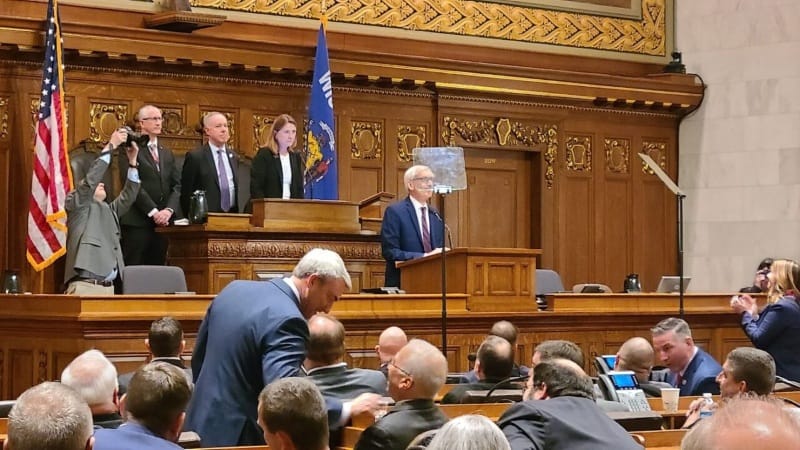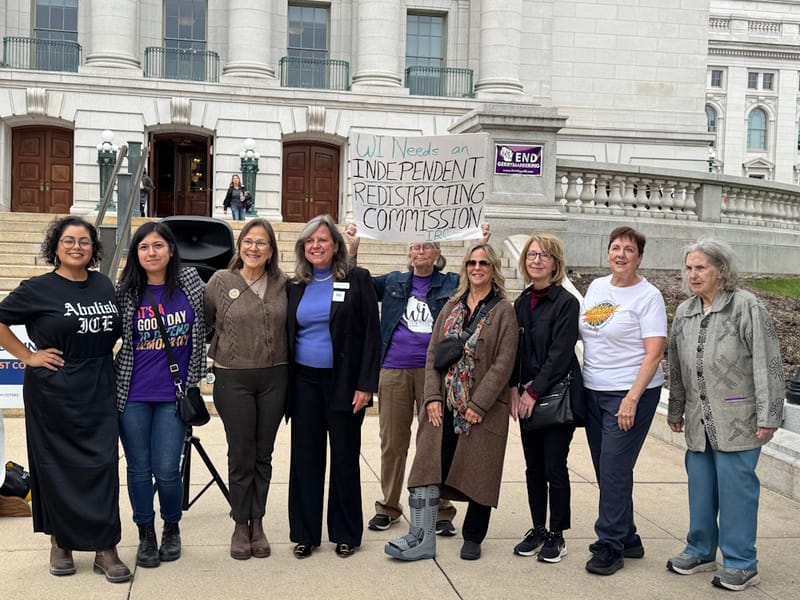Democrats express frustration, disgust at GOP cuts from Evers' budget proposal
The four Democratic members of the Joint Finance Committee argue that the Republicans are simply ignoring what the people have said they want

Republicans on the Joint Finance Committee rejected nearly all of Gov. Tony Evers’ budget proposal, striking more than 600 provisions.
Included in the items the GOP eliminated were the top three issues raised in more than 30 hours of public testimony over the past two months: public education, health care and child care. Republicans say they are prioritizing “fiscal responsibility,” though the state currently has a nearly $4 billion surplus. Evers says they are ignoring what the people want and need.
“There are real and pressing challenges facing our state, whether it’s rising costs, deteriorating water quality, kids’ reading outcomes, generational workforce challenges, or anything in between, and Republican lawmakers have gotten away with doing nothing for far too long,” he responded in a press release. “Wisconsinites are sick and tired of having a do-nothing Legislature. Republicans must get serious about getting things done.”
Other popular provisions eliminated by the JFC would lower prescription drug costs, provide for lead poisoning abatement, and fund PFAS mitigation. The mental health initiative of $300 million for public schools and free school meals for all kids was removed. Tuition assistance for low-income students at the University of Wisconsin was scrapped.
Also eliminated were Evers' proposals to add a new income tax bracket for the highest earners, accept the Medicaid expansion, legalize recreational marijuana, and make permanent the Office of Violence Prevention.
Evers had also proposed $500 million to help support the child care industry, which had received a big boost over the previous three years through the Child Care Counts program. That program was credited with helping to not only keep child care businesses operating but making it more affordable for parents.
It is estimated that more than a quarter of child care centers in the state might close without further funding. Both parties agree there is a child care crisis in the state.
Rep. Lee Snodgrass (D-Appleton) expressed deep frustration and contempt for the GOP's actions, saying they fail to take into account the expressed wishes of their constituents.
"From access to affordable healthcare, child care, housing and mental health support to the need for special education reimbursement increases and community safety, Wisconsinites told us what they needed funded and Republicans turned their backs," she said in a statement. "It's beyond shameful."
At a press conference in Appleton, State Senator Kristin Dassler-Alfheim (D-Appleton), along with Department of Children and Families (DCF) Secretary Jeff Pertl, celebrated National Provider Appreciation Day by touring Bridges Child Enrichment Center with Executive Director Nicole Seebruck Zellmer.
“Supporting the childcare industry and workforce is essential,” Dassler-Alfheim said. “We know that childcare has an overwhelmingly positive impact on kids’ growth, educational outcomes, and overall health and well-being. When communities have access to quality, affordable childcare, kids are more prepared for K-12 and parents are allowed to participate in the workforce, bolstering the economy.”
'Providers have been sounding the alarm for months'
Pertl said ending the Child Care Stabilization will affect not just providers and families but employers, the economy and the community overall.
“Providers have been sounding the alarm for months,” Pertl said. “Twenty-five percent say they are likely to close, and 38 percent expect to raise weekly rates by $25 or more, adding thousands to families’ household budgets per year. It’s absolutely imperative that significant investments in this essential industry are included in the 2025-27 state budget.”
The co-chairs of the 16-member Joint Finance Committee, Representative Mark Born (R-Beaver Dam) and Senator Howard Marklein (R-Spring Green), pointed out that it has become standard practice for Republicans to scrap all or most of the Governor’s Executive Budget and start with base budgeting and that removing nonfiscal items is part of the normal process. Some proposals could be revived as separate legislation later this year.
“This is standard operating procedure,” said Sen. Rachael Cabral-Guevara (R-Appleton). “Now, we will build a budget for Wisconsin that funds priorities, lowers taxes, and ensures we are in good fiscal standing over the next biennium.”
But the four Democratic members of the JFC, LaTonya Johnson (Milwaukee), Sen. Kelda Roys (Madison), Rep. Tip McGuire (Kenosha), and Rep. Deb Andraca (Whitefish Bay) argued that the Republicans are simply ignoring what the people have said they want.
“Time and time again at our JFC public hearings and dozens of additional listening sessions throughout the state, we heard the message that Gov. Evers’ budget proposal offers a positive vision for our state that prioritizes what people spoke up for and addresses the rising cost-of-living for communities throughout Wisconsin,” they said in a press release.
During the next phase of the budget process, the JFC will hold hearings for different agencies and departments and gather input to create its budget. The co-chairs have said they will wait until after reviewing the next revenue projections before tackling major areas of the budget. The state currently has a surplus of approximately $4 billion.
Once passed through the JFC, the budget bill will be sent to the senate and assembly for passage. The legislature will then deliver the bill to Governor Evers to sign, veto, or partially veto. If the 2025-27 Biennial Budget is not passed by the end of June, the funding levels of the previous budget remain in effect.
“The most frustrating part for me as governor is that Republicans consistently reject basic, commonsense proposals that can help kids, families, farmers, seniors and Wisconsinites across our state, all while Republicans offer no real or meaningful alternative of their own,” Evers said. “Republicans talk a lot about what they’re against, but not what they’re for.”
Governor Evers encouraged the public to contact members of the JFC and their local state senator and representative with their budget comments.






